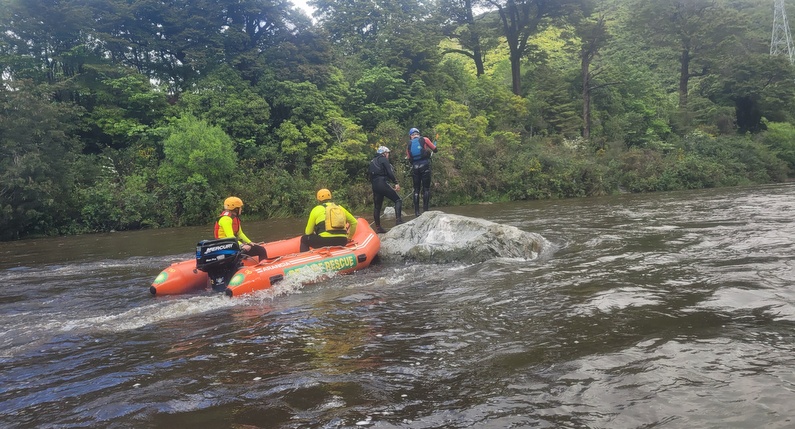
Cooperation in the river corridor
Complementary skills and capabilities improve river search effectiveness in the lower North Island.
“It all started during our response to Cyclone Gabrielle,” says Rob Bigwood, Area Coordinator for the Manawatu / Tararua Surf Lifesaving SAR squad. “The Fire Emergency NZ Urban Search and Rescue (USAR) teams needed to get into flooded buildings to search them. Our team had Inflatable Rescue Boats (IRB) and the training to safely navigate the floodwater. We took responsibility for safe transport, and when the USAR experts were in the building, they took the lead for the search with us in support.”
Closer to home, a search and rescue operation on a flooded Hutt River saw Rob’s team deployed to search for a missing person last seen on the banks. “Our team is specifically trained for river searches, as we get called to jobs on the Manawatu River fairly regularly,” says Rob. Standard procedure is to search in sections. “We travel downstream a short distance from the last known point, and then motor slowly upstream against the current, carefully searching around river hazards such as trees and rocks which could entrap a person.”
A Land Search and Rescue CanyonSAR team from Wellington was also deployed to the Hutt River operation. “That flooded river had lots of nooks and crannies that needed to be cleared, but also large sections of open riverbank in between,” says Alex Waterworth, who is the CanyonSAR Group and Volunteer Support Officer as well as a CanyonSAR volunteer team member. “It was just going to be too slow for us on foot to cover that search area, so we teamed up with the surf lifeguards and it worked really well.”
The combined crews could move quickly between areas of interest. They were agile enough to access difficult spots in the swift water, and thorough enough to conclusively search each entrapment hazard. “It played perfectly to the strengths of each group,” says Alex. “The IRB crew would skilfully get us to a position where we could access a rock or [tree] strainer, then we could get amongst the hazard with avalanche probes and dive masks to thoroughly search it. Meanwhile the IRB would loiter downstream, ready to grab us if we slipped into the current.” Rob agreed that it was an effective collaboration. “Our skills in that environment were best used on the water, whereas the canyon guys were really at home in the water around those hazards.”
Just over a month later, Rob’s team were called to another search, this time on the Manawatu River. “I’d seen the value of the combined team, so I immediately asked the Police if we could get CanyonSAR on the job,” says Rob. Over the previous seven years, Rob has participated in seven searches in that river, where they have found the missing person, unfortunately deceased. “We’re always looking for improvements, for ways to return the missing person sooner to their families. We’ve developed our river-specific capability to cover the rocky whitewater in the Manawatu Gorge, as well as the wide, tree-lined banks above and below the gorge. We have used poles to search into hazards, worked with the Police National Dive Squad, and also with USAR teams that have rugged waterproof cameras. In my opinion, the collaboration with the CanyonSAR teams really stood out as an effective tactic in these situations.”
This combined search capability seems to suit the nature of the rivers and operational tasks in the lower North Island, so the two groups are looking at formalising the relationship with ongoing training and a memo of understanding. Just another great example of SAR agencies working together, for better outcomes for the lost, missing and injured.
Top image: An Inflatable Rescue Boat loiters in the eddy downstream, whilst Canyon SAR volunteers use avalanche probes to search the undercut upstream edge of the boulder. Image courtesy Alex Waterworth
Enjoy this story?
Sign up to our Link Newsletter to receive stories like this plus NZSAR news and announcements direct to your inbox.
Follow NZSAR on LinkedIn for more SAR news, announcements and discussion.
This story was originally published in the July 2025 issue of Link magazine, which is produced by the NZSAR Secretariat for the wider search and rescue sector.
